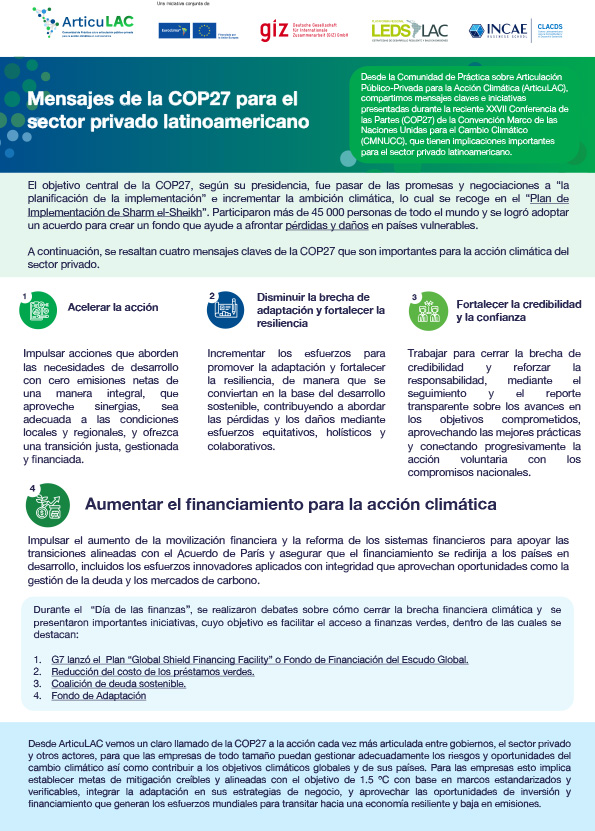A little over two months have passed since more than 30,000 people from 196 countries gathered in Sharm el-Sheikh, Egypt, to advance in the search for solutions to one of today's most alarming problems: climate change. During the 27th Conference of the Parties to the United Nations Framework Convention on Climate Change (COP27), a number of issues related to how to mitigate the emission of greenhouse gases and how best to adapt to the inevitable impacts of climate change were discussed, how to unlock and catalyze climate financeamong others.
In order to bring the results of COP27 to the context of the Latin American private sector, the community of practice ArticuLACorganized a virtual chat on January 20, 2023. The following is a summary of the main COP27 messages for the private sector that were addressed during the chat.
1. Accelerate action
One of the main messages emphasized during the discussion was the need to promote actions that address net zero emissions development needs in a comprehensive manner, that take advantage of synergies, are appropriate to local and regional conditions, and provide a just, managed and financed transition.
In this regard, Virginia Vilariño, Coordinator of the Energy and Climate area of the Argentine Business Council for Sustainable Development (CEADS), commented on the importance of the private sector's commitment and actions to address climate change and achieve the objectives of the Paris Agreement.
"If governments see that companies are contributing, they will increase their ambition, generating a virtuous circle." Virginia Vilariño, CEADS
2. Reduce the adaptation gap and strengthen resilience.
While reducing our carbon footprint to mitigate climate change is critical, another message that stood out during the conversation was the importance of increasing efforts to promote adaptation and strengthen business resilience so that they become the foundation for sustainable development, helping to address loss and damage through equitable, holistic and collaborative efforts.
Claudia Cordero, EUROCLIMA+ Regional Advisor, called for coordinated action to jointly manage the risks of climate change and move towards a resilient, low-carbon economy.
"Climate change is going to affect private sector operations, how to transition to more sustainable business models?" Claudia Cordero, EUROCLIMA+
3. Strengthening credibility and trust
Another important point for the private sector is related to the issue of transparency. It is now essential that companies work to close the credibility gap and reinforce accountability by monitoring and transparently reporting on progress towards committed objectives, taking advantage of best practices and progressively connecting voluntary action with national commitments.
Javier Perla, Libélula's Sustainable Business Manager, emphasized the importance of companies making medium- and long-term climate commitments, which in turn can represent opportunities for new business and risk reduction.
"We are in a process of evolution, where business commitments are becoming more solid, but we need a critical mass, transparency we must see as a mechanism to promote ambition." Javier Perla, Dragonfly
4. Increase funding for climate action.
Finally, the need to push for increased financial mobilization and reform of financial systems to support transitions aligned with the Paris Agreement and ensure that financing is redirected to developing countries, including innovative efforts implemented with integrity that leverage opportunities such as debt management and carbon markets, was highlighted.
In this regard, Yomayra Matinó, founder and leading consultant of GreEnergy, pointed out that business has an important responsibility in this regard and climate action cannot be alien to the business strategy.
"At COP27, the Loss and Damage Fund was achieved, but we must also see how companies can contribute to financing adaptation to climate change." Yomayra Matinó, GreEnergy
In summary, the message is clear: climate action is not a task for national governments alone, so non-governmental actors, such as the private sector, must engage and unite to raise climate ambition and achieve resilient, low-emission development. Furthermore, considering the impacts of climate change that are already being observed around the world, companies must see that the climate issue will affect them, as it has an impact on the market and their entire value chain.
Virtual Conversation
- January 20, 2023
- Virtual

